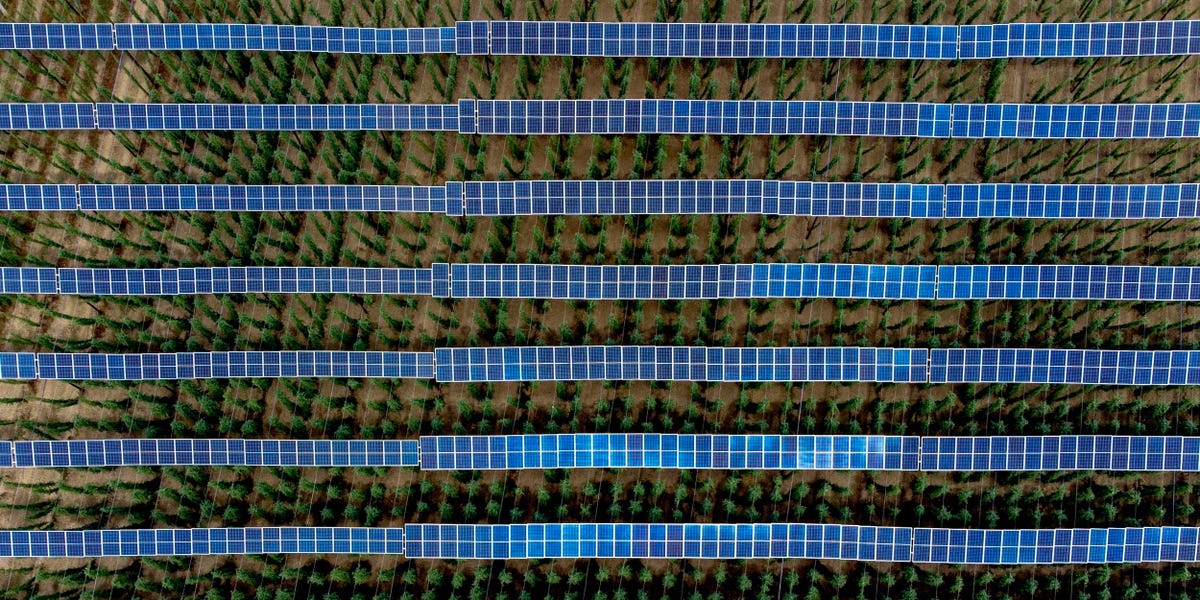Thanks for giving us a bank’s perspective, Business Insider.
This statement brought to you by Greed® and Capitalism™
OH NO! IT’S WORKING! Someone think of the power companies!
My rural electric coop limits the amount they will pay for end user generated solar power per month. They will never let the bill zero out or be negative.
As long as that means there’s a minimum fee that’s going to maintain the grid, I think I’m okay with electric bills not going negative.
I was worried when Germany shut down their nuclear reactors but it’s great news to hear they’re embracing solar hard
I shit down my reactor every time solar goes hard too.
deleted by creator
Yeah. Someone’s ass is going to be badly irradiated.
“people are no longer paying for things they don’t need! this is a disaster!”
That sounds like a good problem to have.
Next step is get those power storage systems in to take advantage of negative pricingBuy this battery, and the power company will pay you to charge it. Problem?
That already happens on large scales. E.g. aluminium smelters will sync their smelters to the grid price.
That sounds exactly like what a power company would say
Why Are they talking like it’s a bad thing?
Because it is a bad thing for the financial interests that Business Insider serves.
It’s a sign of a grid stability issue. A power grid needs to balance input, output and losses. An imbalance in either direction is bad.
A negative price means the grid is worried about a collapse. They are willing to pay sinks to come online NOW, or for production to go offline.
The solution isn’t less renewables however! It’s more storage, and better smarts on the grid. Most grids are poorly designed for renewables, and their loads characteristics. That needs to change rapidly.
In isolation, it’s very obviously a bad thing, because it makes solar less profitable and might slow down the switch to renewables.
In a wider context, it can still be seen as a god thing as it means there has been a significant pivot to solar already and luckily it’s also a very solvable problem. There just needs to be more energy storage.
Won’t energy storage help drive prices back up too?
I guess that depends. If the costs to invest in storage is cheaper long term than losing money from excess energy, then energy companies would lose less money and thus could offer cheaper prices. But it would definitely help decrease or get rid of negative prices.
Negative pricing during peak solar hours has also been happening in California. Longer-term negative pricing has been happening for more than a decade in the Columbia River basin, due to high wind (and wind subsidies per MWh) and high hydroelectric flows.
It’s pretty simple. Negative pricing creates a strong incentive for energy storage. We need more energy storage to support more renewable energy. This was inevitable. I’d love to see a future where people driving their EVs get a pop-up alert: FREE CHARGING AVAILABLE FOR THE NEXT 35 minutes. And the charging network gets paid to take up excess load.
I’d like a future where EV’s aren’t a part of it and worrying about such frivolities as “personal transportation” is a foreign concept.
All of transportation cannot be shared or multi-passenger because some trips are to places where nobody else is going. Perhaps in dense cities, which will take at least 50 years to rebuild in a walkable way in the US. But people will still want to enjoy natural places - lakes, rivers, mountains, deserts, forests, and snow, and there won’t always be rails built to access those places. Electric mountain bikes with a 500 mile range maybe? Personal transportation will always be around.
Ok but if you are in the middle of nature where is this mythical charging station that is going to ping your cell-phone that you should charge your bike in the next 35 minutes? It better not be in the national park you are visiting. I’d also say that in America, removing cars from our national parks and replacing them with rail would be a huge boost to accessibility, and preservation. Hiking/biking trails can and should still exist, but in that world Electric Cars have no place.
National parks are great opportunity for sharing rides, rail, or bus. I think Yosemite valley should be 100% free from personal vehicles. I’m talking about climbing a mountain and starting at the trailhead at 6am. Mountain biking or paddle boarding or surfing. Going fishing or hunting in a place nobody else goes. Maybe you’ve never experienced real solitude, but ridesharing and transit isn’t going to get those experiences. There is not a future free from personal transportation. Even in a post apocalypse anarchy, people will build off grid solutions to drive electric ATVs and bikes and buggies and whatever else.
Personal transportation is great, but it won’t be Electric.
There already aren’t gas stations in these remote locations. Why would there need to be EV chargers??
The thought of having rail service small campsites is comical.
If we did move to a world where cities are dense enough that public transit did replace cars for most people, cars would still be a viable rental for when leaving the city.
Rail service doesn’t go to the campsite. It goes to the trailhead/lodge, then you can hike to your campsite.
If it happens its not happening anytime in the near future.
Sell it to other EU countries. Why is this so hard?
This is happening, to a degree, in most of Europe. Storage is the answer as described in the article. Unfortunately politics are not proactive, you need to break the system before something happens… and now the system is broken, yeah!!!
Most power is produced in the morning to early afternoon. Most power is used in the evening. We just don’t have that much storage yet.
It’s hard to say we’re wasting energy though. There’s a whole lot more solar power than what we’re capturing, after all.
Also, It’s no easy feat to sell lots of electricity far away.
It can be done and is being done, but it’s not simple. If it were, Sahara would be covered in solar panels supplying electricity to Europe and Africa.
Yo, businessinsider, suck my dick.
I’d say that this a weird way to put it. We just have too few other sustainable plants - mainly wind - in our mix.
This is HORRIBLE! How will the JOB CREATORS (who keep laying off thousands of workers) make any MONEY for IMPROVEMENTS to give us CHEAPER and better product?
When nuclear power was first adopted, it was championed as being “too cheap to meter”.
That was never going to happen, and society will allways need people maintaining power infrastructure.
So there should be two charges on your power bill, one for power usage and a static one for use of power infrastructure.
That split system is how it works where I live. Obviously it’s quite difficult to have competition for the infrastructure. So I can choose who delivers power (well, I mean it comes from the same grid. But different companies buying power from the same spot market charge you different amounts 🤷) but the infrastructure is a monopoly. Not only do we pay a fixed fee for the infrastructure, but also a transfer fee (and taxes, and also taxes on the taxes)
So in the end I pay more for the infrastructure part than the power consumption.
The infrastructure one shouldn’t be static either. I’m not fast charging an electric car to ride my non-electric bicycle, I’m not the reason the grid needs expensive upgrades so much…
It’s being metered too now. In Belgium it’s calculated on your max peak usage per month, averaged out over 12 months. You fastcharge 2 cars at once while running a washing machine, electric heater, vacuum, a bitcoinmine etc all at once: your infrastructure part of the bill rises. The only stupidness is that they put the “fictional minimum capacity used” too high, so you don’t benefit from practically 0 capacity usage.
As predicted. The EU policies on solar will drive the same excess in every country. Germany is also going for hydrogen with a large hydrogen network already built and excess electricity would be a great source of power for green hydrogen production (which is vehemently inefficient, but if it’s free…)
One of the nuke plants I work at put in a hydrogen electrolyzer two years ago for this reason, and they are doubling it’s size next year because it worked so well. Their “problem” is different than solar. Nukes constantly put it the same amount of power, so they feed the excess into the electrolyzer when demand is low, but it’s basically the same idea. Electrolysis id inefficient, but if you’re producing more energy than you can feed into the grid you may as well do something useful with it.
Same reason I think carbon capture is worth looking into. It should not be a primary solution. I know some fossil fuel groups are behind it today. But in the not too distant future we are going to have excess green energy. Capturing carbon is worth seeing if we can scale to the point of being one of our tools. People are quick to scoff at the idea. Much like I’ve seen with hydrogen. But I’d rather try many options to reverse change that might not be perfect. Instead of hoping we transition power sources and that alone was enough.
The 2 go well together. Hydrocarbons are an excellent carbon store. Carbon also stabilises the hydrogen, so it doesn’t leak through the walls of your containers. Lastly, it can actually to replace oil in things like plastic production.
In a pinch, you can also burn the result, to get energy back.
I agree. Carbon capture is not the solution, no one thing is, but it should be one of the many things we use to work toward a solution.
this is like a bitcoin miner’s wet dream.
Can’t it just be transmitted over to France, Austria, Poland and Denmark?









